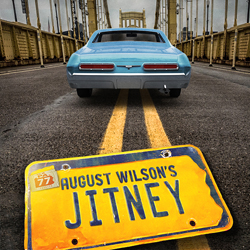
 SAN DIEGO — The sounds of seventies funk sets the stage of the Car Service in Philadelphia. David Gallo’s scenic design brings us into a place that has housed several businesses and definitely seen better days. There are mismatched and missing floor tiles, exposed rafters in the walls and duct tape on the sofa. The makeshift coffee table is a crate on one side, two cinder blocks on the other and a board that’s not quite level. The only bright white piece of the mosaic is the calendar. Everything else has yellowed with age.
SAN DIEGO — The sounds of seventies funk sets the stage of the Car Service in Philadelphia. David Gallo’s scenic design brings us into a place that has housed several businesses and definitely seen better days. There are mismatched and missing floor tiles, exposed rafters in the walls and duct tape on the sofa. The makeshift coffee table is a crate on one side, two cinder blocks on the other and a board that’s not quite level. The only bright white piece of the mosaic is the calendar. Everything else has yellowed with age.
The old neighborhood is being torn up building by building. Most of the shops and apartments have been long boarded up and abandoned. And Jitney’s will be too on the first of the month. The city promises to rebuild, but the people are still waiting.
Their patter and body language have an expressive musicality that’s really fun to watch and listen to. They enjoy the playful camaraderie of old friends who don’t need to be polite. Raised in the Black church, their patter is peppered with Biblical allusions such as the hardening of Pharaoh’s heart, the stolen birthright of Esau and Daniel in the Lions’ Den.
“I just do the best I can do. …But sometimes your best ain’t good enough.”
The older men have learned to accept their lot as Black men in America. But Amari Cheatom as Youngblood is feisty and ambitious. And the stress of his frustrations makes his temper flare.
“I still love you, but love can only go so far.”
Nija Okoro is his partner, Rena. Strong and passionate in her own right, she and Youngblood have a chemistry together that steams and bubbles.
Ray Anthony Thomas is Turnbo, an incorrigible busybody. He assures you that he’s not trying to “get in your business” even as he does. Anthony Chilsholm is quite the entertaining drunk as Fielding. He pickled his own aspirations a long time ago, ever beseeching a few dollars for his next bottle. Which is disturbing considering that he’s a professional driver.
“The Man isn’t out to get you. He doesn’t know you exist.”
Keith Randolph Smith is the eye of the storm as Doub. A great barrel-chested man with a deep, resonant voice and a grey beard, he has seen a grisly side of life that has put things into perspective.
Steven Anthony Jones as Becker is commanding yet too kind. He has worked hard his whole life only to see the things he has built torn down. His son, Booster (François Batiste) has just been released from a twenty-year prison sentence. Once a promising young man, he let some bad choices steal his future. They have a lot of unfinished business as the two haven’t had words in all that time. Bitterness is a dram we drink to the dregs while forgiveness does not come easily.
Throughout Jitney, there are howls of laughter and moments of tension that hold us in breathless anticipation. I can’t think of a better show to bring us from Martin Luther King Day through Black History Month. August Wilson captured the voices of African-Americans in the 20th century. Their voices were filled with hopes and frustrations. They had been emancipated from slavery, but did not yet enjoy full equality. Times were changing, but not fast enough.
And can we really say that times have fully changed? Or is history repeating itself? Gentrification has made neighborhoods like North Park and Barrio Logan cleaner and safer, but then long-time residents get priced out. And even today, Black parents must teach their sons how to survive being stopped by the police in a DWB (Driving While Black) keeping their voices calm and their hands in the air to avoid being shot. And these are social ills we all need to overcome.
Director Ruben Santiago-Hudson wants us to “feel the jolt, vibrancy and electricity of African-American life” and to “feel the dignity of the community.” Come to this show, and you surely will.
August Wilson’s Jitney is playing at the Old Globe through Feb 23.
*
Eric George Tauber is a freelance writer specializing in coverage of the arts. He may be contacted via eric.tauber@sdjewishworld.com